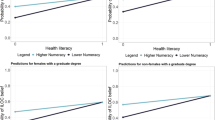Abstract
Background. Recent studies have found that knowledge about cancer prevention and treatment differs across ethnic and socioeconomic status (SES) backgrounds, which could directly impact our decisions to engage in protective health behaviors. In this study, we examined sociodemographic-based differences in cancer knowledge and health beliefs and examined differences in the accuracy of the cancer knowledge based on health beliefs. Methods. Cross-sectional surveys were conducted between July 1995 and March 2004 on adult, healthy, cancer-free control participants (N=2074; 50% male) enrolled into a molecular epidemiological case-control study. Most were non-Hispanic white, 14% were African American, and 8% were Hispanic. Participants were personally interviewed on 6 items assessing health beliefs and 10 items assessing cancer knowledge. Results. Unadjusted differences in cancer knowledge were observed by gender, age, ethnicity, household income, educational attainment, and smoking status. After adjusting for the other sociodemographic characteristics, women had more accurate knowledge than men, the accuracy of knowledge increased with higher educational attainment and annual household income, and never smokers had more accurate knowledge than ever smokers (P<.01 for all). Moreover, accurate cancer knowledge was associated with protective health beliefs; eg, the belief that changing health habits was worthwhile was associated with more accurate knowledge. Conclusions. Results emphasize the need to develop health education programs that enhance cancer knowledge among individuals of low SES and foster protective health beliefs.
Similar content being viewed by others
References
American Cancer Society. Cancer Facts and Figures 2006. Atlanta, GA: American Cancer Society; 2006:2–13.
Ward E, Jemal A, Cokkinides V, et al. Cancer disparities by race/ethnicity and socieconomic status. CA Cancer J Clin. 2004;54: 78–93.
Gansler T, Henley SJ, Stein K, et al. Sociodemographic determinants of cancer treatment health literacy. Cancer. 2005;104:653–660.
Price JH, Everett SA. Perceptions of lung cancer and smoking in an economically disadvantaged population. J Community Health. 1994;19:361–375.
Thomas VN, Saleem T, Abraham R. Barriers to effective uptake of cancer screening among black and minority ethnic groups. Int J Palliat Nurs. 2005;11:562, 564–571.
Rosenstock I. Why people use health sources. Milbank Mem Fund Q. 1966;44(suppl):94–124.
Rosenstock IM, Strecher VJ, Becker MH. Social learning theory and the health belief model. Health Educ Q. 1988;15:175–183.
Bandura A. Social Foundations of Thought and Action: A Social Cognitive Theory. New York, NY: Prentice-Hall; 1986.
Bandura A. Self-efficacy: toward a unifying theory of behavioral change. Psychol Rev. 1977;84:191–215.
Ajzen I, Fishbein M. Understanding Attitudes and Predicting Social Behavior. Englewood Cliffs, NJ: Prentice-Hall; 1980.
Ajzen I. The theory of planned behavior. Organ Behav Hum Decis Process. 1991;50:179–211.
Vega WA, Sallis JF, Patterson TL, et al. Predictors of dietary change in Mexican American families participating in a health behavior change program. Am J Prev Med. 1988;4:194–199.
Rimberg HM, Lewis RJ. Older adolescents and AIDS: correlates of self-reported safer sex practices. J Adolesc. 1994;4:453–464.
Alam AA. Knowledge of breast cancer and its risk and protective factors among women in Riyadh. Ann Saudi Med. 2006;26:272–277.
Branstorm R, Ullen H, Brandberg Y. Attitudes, subjective norms and perception of behavioral control as predictors of sun-related behavior in Swedish adults. Prev Med. 2004;39:992–999.
Hudmon KS, Honn SE, Jian H, et al. Identifying and recruiting healthy control subjects from a managed care organization: a methodology for molecular epidemiological case-control studies of cancer. Cancer Epidemiol Biomarkers Prev. 1997;6:565–571.
Spitz MR, Fueger JJ, Borrud LG, Newell GR. The development of a comprehensive, institution-based patient risk evaluation program: I. development, content, and data management. Am J Prev Med. 1988;4:183–187.
Spitz MR, Fueger JJ, Newell GR. The development of a comprehensive, institution-based patient risk evaluation program: II. validity and reliability of questionnaire data. Am J Prev Med. 1988;4:188–193.
Wardle J, Waller J, Brunswick N, Jarvis MJ. Awareness of risk factors for cancer among British adults. Public Health. 2001;115: 173–174.
Courtenay WH. Constructions of masculinity and their influence on men’s well-being: a theory of gender and health. Soc Sci Med. 2000;50:1385–1401.
Viswanath K, Breen N, Meissner H, et al. Cancer knowledge and disparities in the information age. J Health Commun. 2006;11:1–17.
Stone AJ, Seigel JM. Correlates of accurate knowledge of cancer. Health Educ Q. 1986;13:39–50.
Klesges RC, Somes G, Pascale RW, et al. Knowledge and beliefs regarding the consequences of cigarette smoking and their relationships to smoking status in a biracial sample. Health Psychol. 1988;7:387–401.
Shokar NK, Vernon SW, Weller SC. Cancer and colorectal cancer: knowledge, beliefs, and screening preferences of a diverse patient population. Fam Med. 2005;37:341–347.
Ben-Shlomo Y, White IR, Marmot M. Does the variation in the socieconomic characteristics of an area affect mortality? BMJ. 1996;312:1013–014.
Zimmerman M, Ruggero CJ, Chelminski I, et al. Developing brief scales for use in clinical practice: the reliability and validity of single-item self-report measures of depression symptom severity, psychosocial impairment due to depression, and quality of life. J Clin Psychiatry. 2006;67:1536–1541.
Author information
Authors and Affiliations
Corresponding author
Additional information
Supported by Public Health Service grants CA 55769, FAMRI, CA 70907, and CA 105203 from the National Cancer Institute, National Institutes of Health, Department of Health and Human Services.
Rights and permissions
About this article
Cite this article
Wilkinson, A.V., Vasudevan, V., Honn, S.E. et al. Sociodemographic characteristics, health beliefs, and the accuracy of cancer knowledge. J Canc Educ 24, 58–64 (2009). https://doi.org/10.1080/08858190802664834
Issue Date:
DOI: https://doi.org/10.1080/08858190802664834



